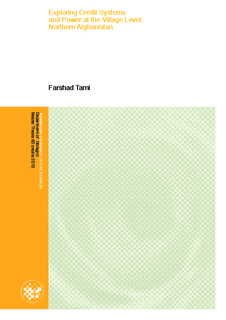| dc.description.abstract | In the absence of a strong state in Afghanistan it is very challenging to provide rural households with better food security and access to sustainable, well-established and regulated financial institutions. This paper researched livelihood strategies, credit systems and power relations in two villages from Belcheragh District, in Faryab Province, during summer 2008. Through the use of qualitative methods the study explored in-depth strategies such as remittances, agriculture and carpet weaving incomes, life-cycle activities, credit systems, including micro-credit schemes and the common local credit transactions, and finally, power networks. The study also explored how these strategies are changing in Afghanistan in the face of changes in the political, social and economic conditions. The study found that social networks, through which less privileged households gain access to credit, are exploitative in nature. Access to land and credit for the more privileged households allows them to also have a say in who gets what in the village, mainly micro-credit schemes, the local credit transactions and other livelihood incomes. Finally, the study provided detailed information on the situation in Belcheragh District for development actors such that they can improve their own micro-credit schemes and other activities related to food security. | en_US |
